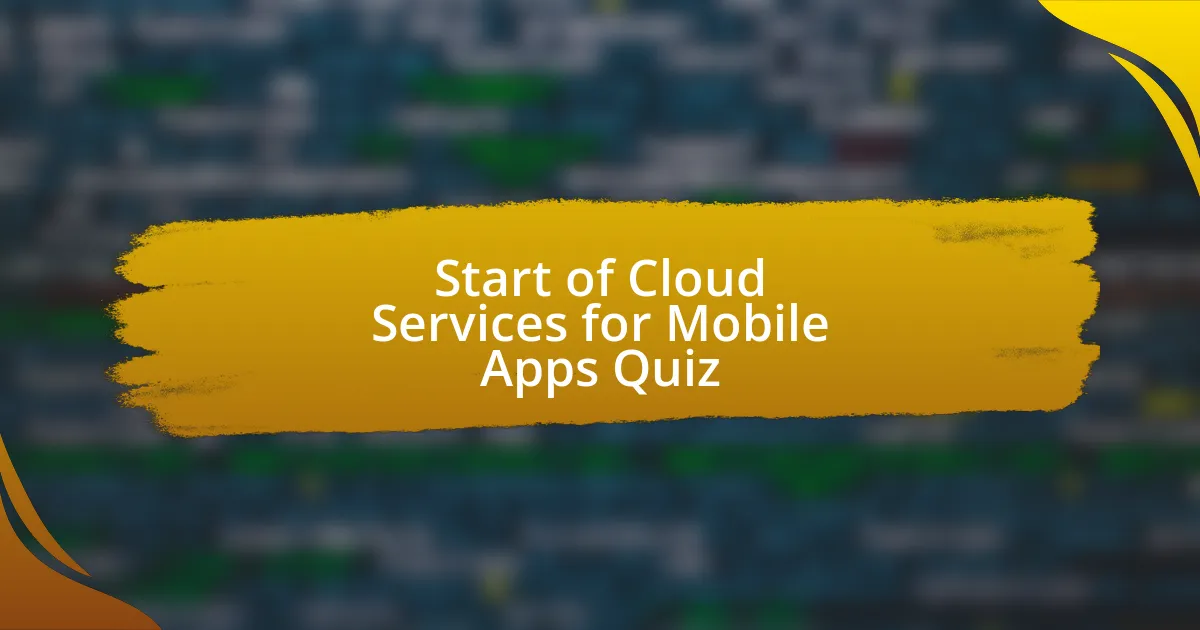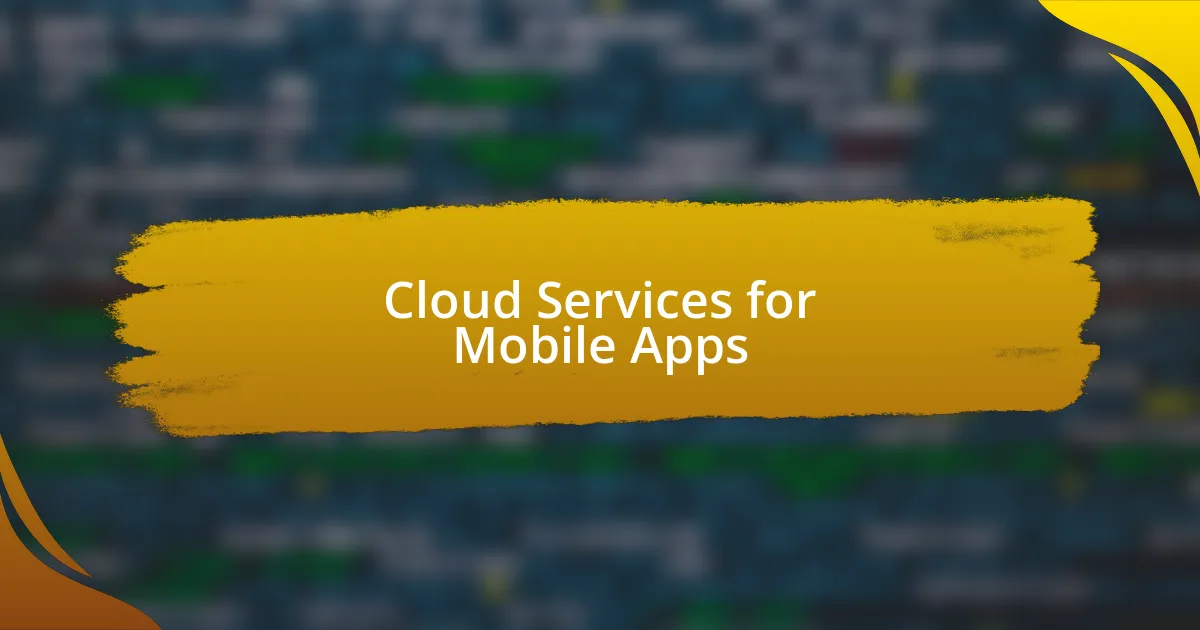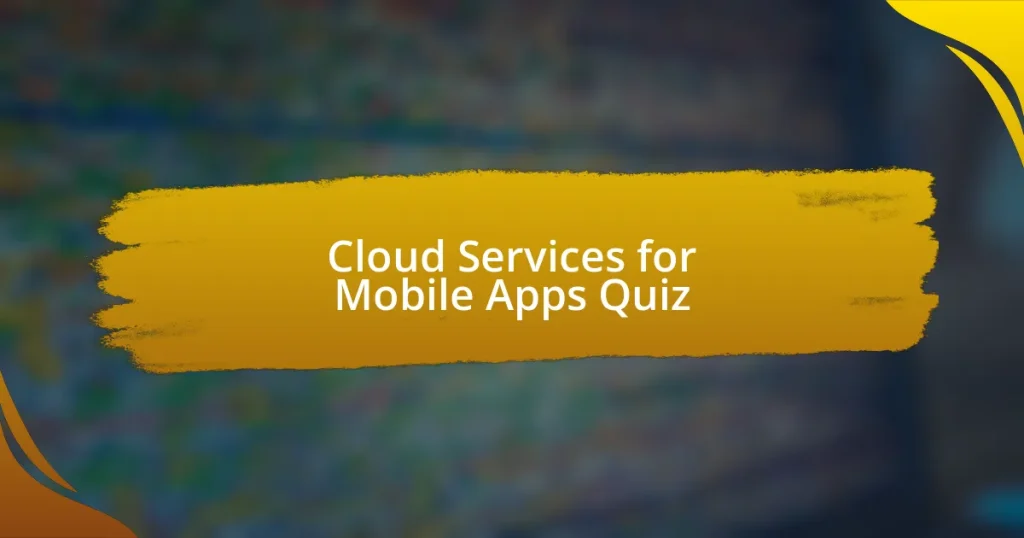
Start of Cloud Services for Mobile Apps Quiz
1. What is the primary function of the Google Cloud mobile app?
- Troubleshooting and managing cloud applications from anywhere.
- Editing documents collaboratively in real-time.
- Creating and designing mobile applications directly.
- Storing photos and videos in the cloud.
2. Which platforms are the Google Cloud mobile app available on?
- Windows and Linux systems.
- iOS and Android devices.
- Mac OS and Chrome OS.
- Blackberry and Java phones.
3. How do you sign in to the Google Cloud mobile app?
- With a smartphone authentication app.
- With your Google account settings.
- With your email and password.
- With your Google Cloud credentials.
4. What services can you monitor using the Google Cloud mobile app?
- Firebase, Cloud Functions, Cloud Firestore, and BigQuery.
- Cloud Pub/Sub, Cloud Dataflow, Google Kubernetes Engine, and Container Registry.
- Compute Engine, App Engine, Cloud Storage, and Cloud SQL.
- Cloud Logging, Cloud Monitoring, Google Workspace, and Cloud Run.
5. What is the purpose of monitoring uptime checks in the Google Cloud mobile app?
- To reduce the size of application logs.
- To track the health of services over time and inform SLAs and SLOs.
- To increase download speed for mobile users.
- To create backup copies of data automatically.
6. How can you manage permissions using the Google Cloud mobile app?
- Through email notifications.
- Using IAM.
- By adjusting firewall rules.
- By resetting user passwords.
7. What feature allows you to view and manage incidents in the Google Cloud mobile app?
- Cloud diagnostics
- Service monitoring
- Incident reporting
- Production alerting
8. How does the Google Cloud mobile app help with troubleshooting?
- By allowing quick actions such as suspending, stopping, or restarting a VM, searching logs, and connecting to a VM via SSH.
- By providing extensive training materials for developers.
- By automatically fixing errors without user intervention.
- By scheduling automatic backups of all data.
9. What is the purpose of latency trace data in the Google Cloud mobile app?
- To enhance the visual design of the mobile app interface.
- To store user data securely on the cloud.
- To compress application data for faster loading.
- To view latency trace data and inspect requests made to your application.
10. What is the key feature of the Google Cloud mobile app for managing cloud applications?
- Monitoring email communications and cloud plugin integrations.
- Creating and editing website content and cloud architecture designs.
- Managing local device settings and operating system updates.
- Resource status, billing details, custom dashboard, quick actions, application errors, incidents, and latency trace data.
11. What recent feature was added to the Google Cloud mobile app for better troubleshooting?
- Suspend/Resume for Google Compute instances.
- Enhanced billing summary feature.
- New user interface for dashboards.
- Improved Cloud Shell interface.
12. How can users use gcloud commands more easily in the Google Cloud mobile app?
- Through advanced data analytics tools.
- With manual script execution only.
- Using improved Cloud Shell functionality.
- By implementing local storage features.
13. What information can non-billing administrators check in the Google Cloud mobile app?
- User access logs.
- Server uptime statistics.
- Application storage quotas.
- Project scope billing information.
14. How do you download the Google Cloud mobile app?
- Via third-party download websites.
- Through a USB connection on your computer.
- From Google Play or the Apple App Store.
- By sending a request to Google Cloud support.
15. What are some examples of cloud storage solutions for mobile app development?
- Slack Channel
- Dropbox Papers
- Google Cloud Storage
- Microsoft Word
16. What is the benefit of using cloud storage solutions in mobile app development?
- Enhanced offline capabilities.
- Secure, scalable, and cost-effective data management.
- Improved user interface design.
- Faster coding and debugging processes.
17. How does cloud computing enhance mobile app development?
- By restricting collaboration among development teams and users.
- By limiting access to essential resources and increasing delays.
- By relying solely on local servers for data processing and storage.
- By providing secure storage, scalable APIs, and real-time updates.
18. What is the role of APIs in cloud-based mobile app development?
- Ensuring the mobile app is user-friendly and visually appealing.
- Integration with other services and functionalities, reducing development complexity and time.
- Creating back-end systems to store application logs.
- Managing user data storage efficiently for faster access.
19. Which cloud platform provides automatic scaling and App Engine?
- Amazon Web Services
- IBM Cloud
- Google Cloud Platform
- Microsoft Azure
20. What is the benefit of using auto-scaling groups in AWS?
- Limited data storage and retrieval options.
- Reduced network security and data privacy.
- Flexible resource allocation to meet user demands.
- Increased server maintenance and costs.
21. Which Azure service provides functions as a service?
- Azure Logic Apps
- Azure Virtual Machines
- Azure Blob Storage
- Azure Functions
22. What is an example of a SaaS cloud service?
- Google Workspace
- Adobe Photoshop
- Microsoft Word
- Skype
23. What is the most refined and restrictive cloud service model?
- Software-as-a-Service (SaaS)
- Function-as-a-Service (FaaS)
- Hybrid Cloud Solution
- Infrastructure-as-a-Service (IaaS)
24. What is the primary concern in cloud computing?
- Bandwidth
- Compatibility
- Security
- Processing speed
25. Which cloud service model involves virtualizing hardware in the cloud?
- Software-as-a-Service (SaaS)
- Network-as-a-Service (NaaS)
- Infrastructure-as-a-Service (IaaS)
- Platform-as-a-Service (PaaS)
26. How many phases are there in cloud computing planning?
- Five phases: Initiation, Planning, Execution, Monitoring, and Closure.
- Two phases: Analysis and Design.
- Three phases: Strategy, Planning, and Deployment.
- Four phases: Research, Development, Testing, and Implementation.
27. What is an example of a SaaS service?
- Microsoft Word
- Dropbox Paper
- Adobe Photoshop
- Google Mail
28. What is the driving philosophy behind mobile cloud apps?
- Increasing productivity by enabling more accessibility to the app.
- Reducing application load times for better performance.
- Enhancing security features for user data protection.
- Simplifying user interface design for better usability.
29. What is the primary advantage of cloud-based mobile apps?
- Increased storage costs and limited access.
- Complicated user interface and slow performance.
- Dependency on local servers for access.
- Streamlined data management and reduced development complexity.
30. Which cloud service model integrates multi-cloud environments with on-premises networks?
- PaaS
- Hybrid Cloud
- SaaS
- IaaS

Quiz Successfully Completed!
Congratulations on completing the quiz on Cloud Services for Mobile Apps! We hope you found the experience enjoyable and informative. Quizzes like this are fantastic tools for reinforcing what you’ve learned. They challenge your knowledge and encourage critical thinking about how cloud services enhance mobile app development.
Throughout the quiz, you likely discovered various aspects of cloud services, such as their benefits, popular platforms, and essential features. This knowledge is valuable as it equips you to make informed decisions about using cloud infrastructure effectively. Understanding these concepts will help you build more robust and scalable mobile applications.
If you’re eager to dive deeper, we invite you to explore the next section on this page. There, you’ll find more detailed information on Cloud Services for Mobile Apps. This additional material will expand your understanding and provide practical insights. Happy learning!

Cloud Services for Mobile Apps
Introduction to Cloud Services for Mobile Apps
Cloud services for mobile apps refer to a suite of online tools and resources that enable app developers to host, store, and manage their applications and data over the internet. These services facilitate scalability, reduce infrastructure costs, and enhance data security. By utilizing cloud services, developers can easily deploy updates and maintain high availability. Several leading providers, such as Amazon Web Services (AWS), Google Cloud Platform (GCP), and Microsoft Azure, offer robust solutions tailored for mobile applications.
Types of Cloud Services Available for Mobile Apps
Cloud services for mobile apps primarily fall into three categories: Infrastructure as a Service (IaaS), Platform as a Service (PaaS), and Software as a Service (SaaS). IaaS provides virtualized computing resources over the internet, allowing developers to manage servers and storage. PaaS offers a platform for developers to build, deploy, and manage applications without dealing with complex infrastructure. SaaS delivers software applications over the internet on a subscription basis, reducing the need for local installations. Each type offers unique benefits tailored to mobile app development.
Benefits of Using Cloud Services for Mobile Application Development
Utilizing cloud services in mobile app development provides several key advantages. Firstly, they allow for greater scalability; apps can handle varying loads effortlessly. Secondly, developers can access powerful resources without significant upfront investments. Thirdly, cloud services improve collaboration by enabling remote teams to work together seamlessly. Lastly, automatic updates and maintenance reduce the developer’s burden, allowing them to focus on enhancing app features and functionality.
Security Considerations for Cloud Services in Mobile Apps
Security remains a critical concern when integrating cloud services into mobile applications. Developers must ensure data encryption both in transit and at rest to protect sensitive information. Additionally, robust authentication mechanisms ensure that only authorized users can access the application and its data. Regular security audits and compliance with regulations, such as GDPR or HIPAA, further help in maintaining a secure environment. Leading cloud service providers offer built-in security features, but developers are responsible for implementing them effectively.
Future Trends in Cloud Services for Mobile Applications
The future of cloud services for mobile applications is marked by emerging trends such as edge computing, serverless architecture, and AI integration. Edge computing reduces latency by processing data closer to the user, enhancing application performance. Serverless architecture allows developers to build applications without managing servers, which simplifies deployment. Additionally, integrating AI into cloud services enables smarter analytics and personalized user experiences. These trends indicate a shift towards more efficient and intelligent mobile applications.
What are cloud services for mobile apps?
Cloud services for mobile apps are platforms that provide backend capabilities through the internet, allowing developers to store data, manage analytics, and leverage various functionalities without maintaining physical servers. These services enable features such as user authentication, data storage, and push notifications. Notably, popular providers include Amazon Web Services, Microsoft Azure, and Google Cloud Platform, which offer scalable resources and APIs that enhance app performance and user experience.
How do cloud services enhance mobile app development?
Cloud services enhance mobile app development by providing scalable infrastructure, enabling easier management of resources and data storage. They allow developers to deploy updates instantly without needing physical equipment changes. Additionally, cloud services offer built-in security measures and compliance with regulations, streamlining the protection of user data. According to a report by Gartner, 85% of organizations had a multi-cloud strategy in place by 2022, indicating the reliance on cloud resources for app development.
Where are cloud services for mobile apps hosted?
Cloud services for mobile apps are hosted in data centers operated by cloud service providers, which are strategically located worldwide. These data centers utilize vast networks of servers that ensure high availability and performance. Major providers like AWS, Azure, and Google Cloud maintain data centers across multiple global regions to enhance speed and comply with regional data regulations, thereby ensuring that services are accessible and reliable for developers and users alike.
When should developers consider using cloud services for their mobile apps?
Developers should consider using cloud services for their mobile apps during the initial stages of development, especially if they anticipate high user traffic or need to scale resources dynamically. Additionally, when an app requires real-time data access or collaboration features, cloud services are essential. A survey by Flexera in 2021 indicated that 92% of enterprise organizations used cloud services to facilitate scalability and flexibility in app deployment.
Who benefits from cloud services in mobile app development?
Both developers and end-users benefit from cloud services in mobile app development. Developers gain access to flexible resources and tools that accelerate the development process and reduce costs. End-users benefit from improved app performance, seamless updates, and enhanced security. According to a 2020 study from McKinsey, organizations using cloud services reported a 19% increase in efficiency, highlighting the advantages for all stakeholders involved.














